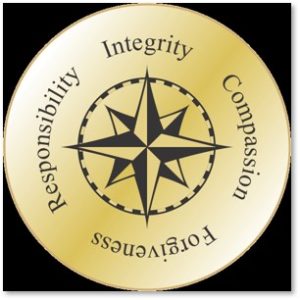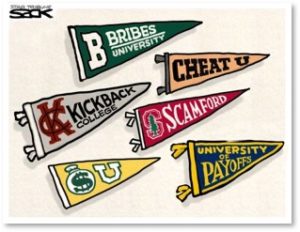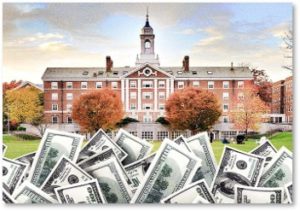“Teach your children well,
Their father’s hell did slowly go by,
And feed them on your dreams
The one they pick’s, the one you’ll know by.”
— Graham Nash
 In all that has been written about the college-admissions cheating scandal, including Susanne’s post on Monday, most critics have commented on the actions of parents, teachers, and coaches.
In all that has been written about the college-admissions cheating scandal, including Susanne’s post on Monday, most critics have commented on the actions of parents, teachers, and coaches.
Few have looked at this scandal from the perspective of what it teaches the young people involved in it. After all, how can your children have a moral compass if you set the wrong example?
Some Cynical Questions
Last week a friend commented that she felt sorry for the kids who didn’t know this was happening. Really? Maybe I have gotten super cynical but, somehow, I doubt that the high school students in the middle of this mess remained completely clueless. After all:
- Doesn’t it feel weird when all your classmates are taking the SAT exam but you’re not because a ringer is taking it for you?
- Do you not ask what’s going on when you pose for pictures as an athlete, even though you don’t play the sport?
- Might you wonder why your SAT coach is waiting outside the special room where you took the exam—alone?
- Did these parents not brag about the big bucks spent to get the not-so-little darlings into a top university?
- Did none of the students ask what the promised “side-door admissions” were?
- How many students protested being coached on what to do, what to say, what to write, to get that side door opened?
What Did They Know About Cheating?
I could ask the old Watergate question: What did these kids know and when did they know it? But we understand that only important thing is they do know it—because that’s the lesson they are learning.
 If your parents set an example that cheating, lying, and scamming constitute acceptable—even admirable—behavior, that’s what the young people learn. If the parents say by their actions that you should buy your way into places you can’t earn on your own merit, that’s what the students take as a guiding principle.
If your parents set an example that cheating, lying, and scamming constitute acceptable—even admirable—behavior, that’s what the young people learn. If the parents say by their actions that you should buy your way into places you can’t earn on your own merit, that’s what the students take as a guiding principle.
And if the parents tell their children either directly or indirectly that they are so special that the rules don’t apply to them, those young adults will build their careers on that attitude.
Cheating and Warped Values
In the long run, these young people internalize corrupt values and emerge with a very warped idea of how to get ahead in the world. As the New York Times’ Frank Bruni said recently in “The Moral Wages of the College Admissions Mania:”
“The principles instilled in these children? That nothing in your life is too sacred to be used for gain. That you do what it takes and spend what you must to get what you want. That packaging matters more than substance. That assessments made by outsiders trump any inner voice.”
Do you want those the employees in your company? Would you hire those privileged kids for your team?
Working in the Real World
 Given that Rick Singer, along with his cadre of coaches and admissions officers, have been at this dirty game for years, many of their “clients” are already working.
Given that Rick Singer, along with his cadre of coaches and admissions officers, have been at this dirty game for years, many of their “clients” are already working.
Some of them may (I hope) run into a brick wall when they try to leverage their privilege in the real world. Others will use their contacts to take jobs for which they are neither qualified nor suited—jobs that others who worked hard and played by the rules won’t ever see. Thus, instead of the best and the brightest, companies hire those who are dumb and dumber—but rich and connected.
Connected Mediocrities
“They were born on third base and go through life thinking they hit a triple.”
— College Football Coach Barry Switzer
You may shrug and say, “That’s the way the world works. Get over it.” Certainly, those of us who live in New England, home of many prep schools and four Ivy League universities, have met our share of connected mediocrities. We have worked for and with frat bros and dorm roomies who occupy corporate positions way above their IQ scores. They don’t question their title or how they got there; they simply accept that privilege as their due.
 And then—this is the thing that really gets me—The Dunning-Kruger Effect sets in and they start believing that they are smarter than they are. They also believe that they have earned their success. They become blind to the privilege that lifted them up.
And then—this is the thing that really gets me—The Dunning-Kruger Effect sets in and they start believing that they are smarter than they are. They also believe that they have earned their success. They become blind to the privilege that lifted them up.
Warped Self Perception
This warped self-perception of competence causes these privileged kids to remember the times they actually did work and discount the time spent in parties, on ski slopes, sleeping in, smoking weed, and dancing on the beach at Spring Break. Their little bit of school work magnifies in their minds until they actually believe that no one ever gave them anything. They are where they are because they deserve it.
That’s how we end up with overpaid CEOs who bankrupt their companies and drive them into the ground. That’s how we look at a slate of political candidates and wonder, “Can’t we do better than this?” That’s why we have bankers who come up with dangerous investment schemes and think they’re brilliant. And it’s why we have a lot of extremely wealthy people who refuse to share with those in need. If your life has been based on the delusion that you deserve to be selfish, why share with others who you consider less competent or hard-working than you?
Hollow at the Core
Others, however, know they didn’t earn their place in that prestigious school and thus their entrée into a career. They know they are not as smart and unworthy of the privilege bestowed on them. That affects how they feel about themselves, their intellect, their creativity, and what they have to contribute. In essence, their parents have robbed them of their ability to succeed on their own and thus gain a sense of competence that will take them through life. They continually question their own abilities.
These parents think they are giving their children everything but, in reality, they are taking away what really matters. Distorting their understanding of themselves, denying them a moral compass, setting them up to fail over time, or to constantly question their abilities is the worst gift parents could give their children.
In the long run, I thing that will be the greater tragedy. When the trials and lawsuits have finished, when fines have been paid and prison doors locked, these kids will know they are the true frauds.

